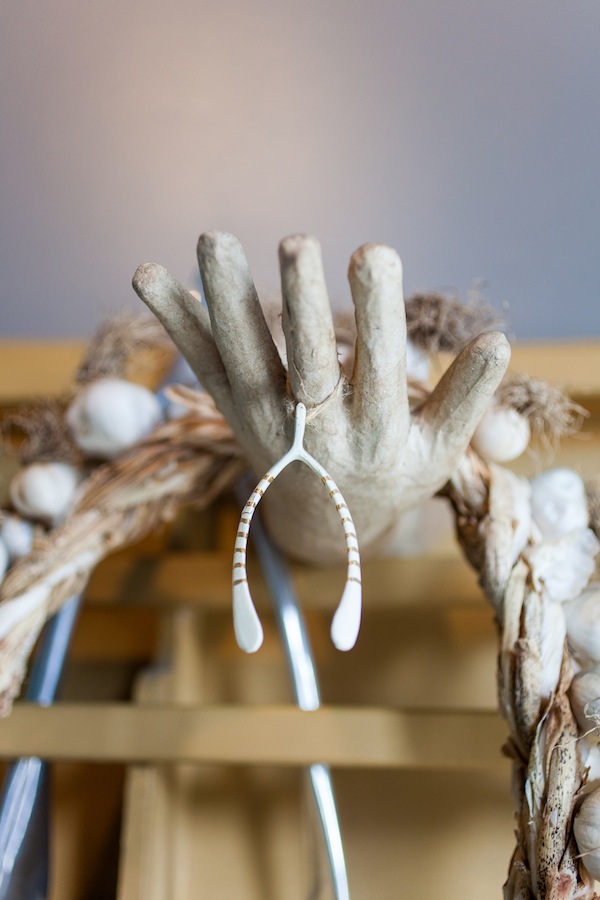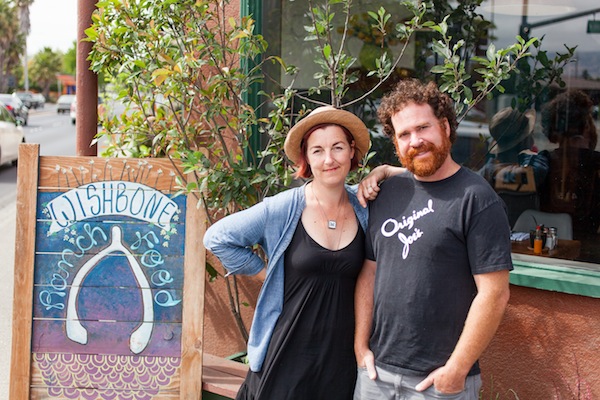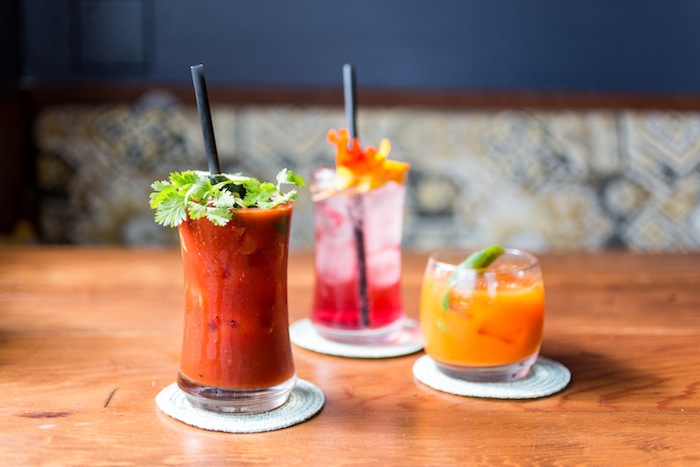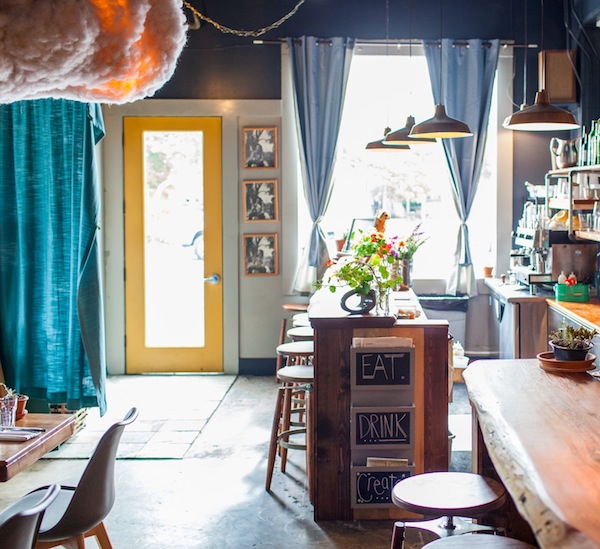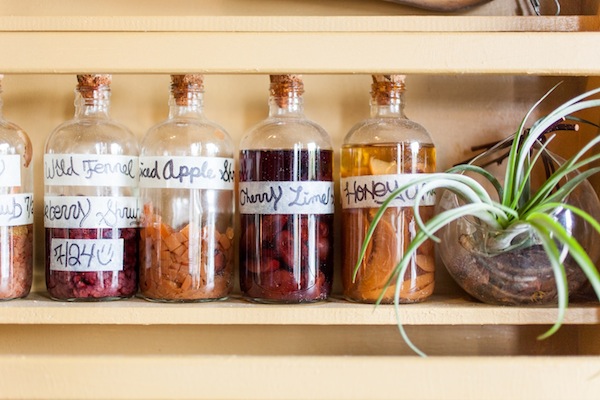A young couple moves north to survive the Zombie Apocalypse and ends up reinventing ranch food.
Miriam Donaldson and Josh Norwitt have amassed a loyal following since opening Wishbone in 2014, at the site of the old Three Cooks Cafe in Petaluma. Some of those fans are carryovers from Humble Pie, the six-table Penngrove joint the couple ran until 2010, famous for its pie and pork chops. The two started Humble Pie with zero formal culinary training and even less experience as restaurateurs. The whole adventure seemed like the thing to do, what with Donaldson’s self-taught knack for making intelligent comfort food and Norwitt’s industrious maker’s mind. Mind you, these are the same people who lived for years in a trailer with no running water while Norwitt, 35, taught himself how to build a house. They still live, now with five-year-old daughter Poppy, in that homespun cottage on 160 acres of family land off Roblar Road between Cotati and Bloomfield. So far, the non-conformist approach to food—and life—has served them well.
At Wishbone, Donaldson, 34, has built a small, enticing menu that utilizes meat from cows raised on the family ranch and other local purveyors like Love Family Farm. The vegetables come from local farms like Green String, along with more far-flung spots in the Central Valley. The Scottish Highland cattle on the Norwitt Ranch came from Ted Fuller, a heritage breed rancher from Berkeley who once rented land from the family. Fuller practiced a literal “do-nothing” approach to animal husbandry. When he moved on, he left Norwitt and Donaldson 14 cows and calves: four years later, the herd tops out at 50. They roam with wild abandon across the ranch, a vision of rolling green hills and stunning views of the mountains and valleys to the east and west. Purchased for $30,000 by Norwitt’s grandparents in the 1950s, the ranch is the beating heart of the couple’s lives, and of Wishbone, where a curious, creative, rambunctious, and ethical approach to food and community is the mode of operation.
We sat down with Norwitt and Donaldson to get a behind-the-scenes glimpse of life at Wishbone.
MLM: How did you get into ranching?
Josh Norwitt: We had no idea how to raise cattle, though my dad once had a herd at a dairy operation in Missouri. We saw that Ted did nothing and it seemed like we could carry that on. At Humble Pie, we succeeded in growing an actual real percentage of the vegetables that we were using at the six-table restaurant.
Miriam Donaldson: We had never planted a garden before.
JN: When the beef came up, we were like, well, duh, let’s raise cattle and put it on a menu. Let’s do that and find another restaurant space, and let’s keep this going.
MD: We walked into a ranch without much infrastructure, fencing. There was no barn. Our family legacy is an uninhibited 160 acres of pleasuredom, do what you want. Josh’s dad did a few agricultural pursuits there, but Josh and I have come in third generation and said, ‘Let’s build a barn. Let’s put up fences and rotate.’ The ranch is all family and it belongs to the commonwealth of everyone that lives there. It’s very open for us to play with and tinker with, but at the same time, everything we do has to be part of the common interest. The restaurant and the ranch need each other.
JN: Fifty is the perfect number. We’re selling cows, we’re selling calves, we’re taking meat for the restaurant.
MD: We sell half cows and quarter cows for people’s freezers and stuff.
JN: I love that. It’s such a unique thing when people come in for breakfast. They eat some pancakes and they leave with eight pounds of ground beef. That’s so funny. That’s so ridiculous.
When the only USDA slaughterhouse in Sonoma County was shut down by the feds in 2014, the restaurant went months without hamburgers on the menu. Donaldson said it was “terrifying” to think they might not have a nearby place to take their animals for slaughter.
MD: When Marin Sun Farms took over, there was a general worry that the owner wasn’t going to offer custom kill. He doesn’t have to offer that, and a lot of people don’t. We had to wonder if we’d stop breeding cows.
MLM: How about sourcing? What does that look like for Wishbone?
MD: You have to pick your battles. Whittle your menu down to what you can do. You have to realize what’s really important in the season. People are going to want some form of tomato two months before they are ready. How do I work with what’s in season to manipulate it into something restaurant customers actually want? Do I really need to buy local onions? Are they from the Central Valley? Okay, great. In Sonoma County, there’s not a lot that we have to go really far for. I have a purveyor I work with for conventional produce. Like potatoes. There’s a great potato guy here in town named David Little who does the most gorgeous potatoes you could ever want, but I can’t use those for brunch. I’m going to pick all the best proteins I can, the best cheeses I can. I’m going to go with proper dairy; I’m going to go with vegetables that are in season. And I’m going to buy you a conventional potato, and I’m going to mash it with cream and butter, and here you go.
When I’m writing out the menu, I want to mention every single farm that came into it. I want to mention every single crazy process. I want to mention that Josh raised that pastrami, and cured that pastrami, and smoked that pastrami, but you just run out of room. You type that whole thing up and look at it, and you realize either no one cares, or I care too much. Then you’re like, look, what really matters?
I don’t need a cotton shirt from India. But, I’d love a pineapple because I can’t grow that here. If you’re going to put something on a damn boat, put food on it. I’m not super worried about importing food from outside of where we are. I still think local is a beautiful thing for the infrastructure and for the community that it builds, especially when you’re talking about farming practices and animal husbandry. Josh won’t eat meat unless he’s been to the farm. I think that’s reasonable. As long as you’re picking produce that you can put good faith into, it’s okay to bring it in from out of town. I feel the same way about meat as long as you aren’t undercutting your community.
Norwitt grew up on the family ranch but moved away to pursue a career in theater and music. He worked in restaurants to pay the rent. Donaldson, a visual artist, worked in kitchens too. In 2005, they left San Diego and returned to the family land in Sonoma County, looking for a rent-free situation and a place to put down roots in an unstable economy. They half-joke that they were looking for a place where they could survive a “zombie apocalypse.”
MD: I never thought we’d have a restaurant. When I landed here I was like, what am I going to do? I looked around and the coolest, most interesting, and constantly changing thing I saw happening was food. I feel really lucky to be where we are. I can’t imagine another place where it would have been possible for us to do something like this. I mean, we started at the Black Cat. We started at the gay bar in Penngrove with six tables. That’s impossible. That’s stupid. We had no idea what we were doing. It was the luck of the draw.
MLM: So there’s an element of craziness to what you do?
MD: It’s theater. I think the fact that it’s so unreasonable creates creative chaos and possibility.
JN: Between building a restaurant world and building a ranch/farm world, those two things, we can go anywhere. There’s no limit to the amount of weird projects that we can get into.
MLM: Where do you fit into the Sonoma County food scene?
MD: I think we operate in a vacuum a lot.
JN: I don’t feel like we’ve been well-represented. People write about the awesome pancakes, but no one’s ever written about the pastrami sandwich they had that I raised and cured, served on sourdough made by my brother (Norwitt’s brother-in-law is the baker at Wishbone). The entire sandwich has traveled a total of five miles. It went from the ranch, it made a stop at the slaughter house that I can literally see from a window in the restaurant, and it went to Wishbone. That’s it.
MD: But at the same time, I don’t think we’ve ever been like local, local, local!
MLM: There are so many food workers in Sonoma County and they are one of the lowest paid workforces. The cost of living continues to rise. Do you try to pay your workers a fair wage?
MD: Josh and I worked at the back-end of restaurants for years. When we opened Humble Pie, we only had one employee. We split tips equally, there were only three of us. When we moved into Wishbone, we were like okay, what do we do? Our lowest paid employee makes $12 an hour. It’s really dicey right now to talk about mandated tip-splitting.
JN: We are clear with our employees. There is a set percentage that they tip out to the back of the house. Almost 40 percent of the total take goes to the back of the house. It’s an established part of the culture. As it was explained to me: How much are you going to make in tips without a kitchen? How well are you going to do today if there’s no dishwasher? I have no problem with not dancing around that. I think that’s something that people should talk about loud and clear.
MD: Look, in Sonoma County, servers cannot buy houses. No matter how much I pay a server. Either I’m going to go out of business paying that server enough to buy a house or . . . it’s just not going to happen. All we can do is do the best we can for all of our employees and demand the most of them that we can. You know, we had a ranch day a couple of weeks ago. We invited the Wishbone staff up to help. I’m like, I can’t pay you, but I will feed you!
JN: We had eight people from the restaurant. We fenced an entire line, probably a quarter mile of fence.
MD: You’ll only get that kind of willingness to participate if you intentionally try to treat people really well.
JN: Everything is fueled by the restaurant. That’s where money is coming in, that’s where we are growing our community of people. Wishbone requires such an immense amount of time that all these other things—getting the right water, getting the right pasture rotation, getting the right infrastructure up at the ranch—have to happen in the couple of hours between when I’m done shutting down the kitchen and the sun goes down.
MD: It also means we have to find people that we can rely on and listen to.
JN: We have an incredibly dedicated staff that are way up in our business. They are doing a great job. What’s the old cartoon where there were robot tigers and lions, and they were all awesome, and they all came together in one giant robot? That’s what we’re doing right now.

